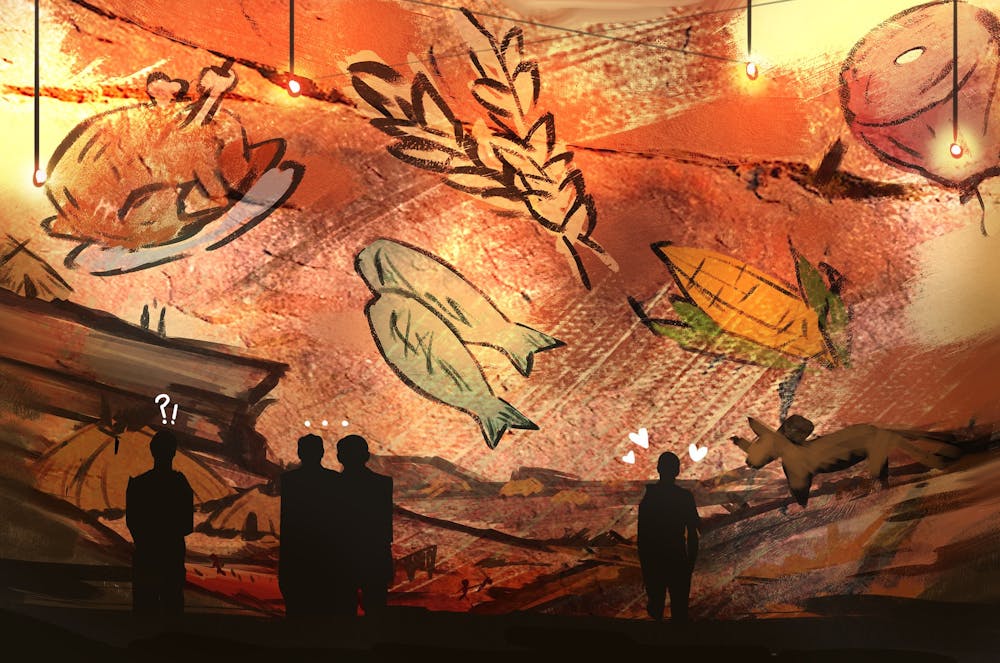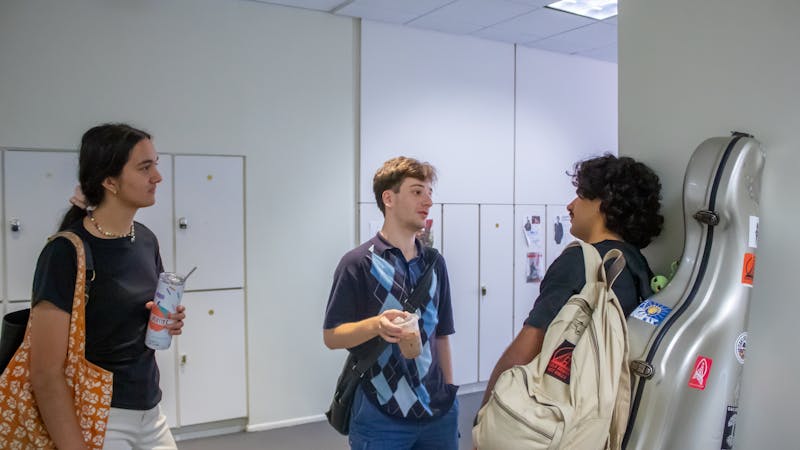‘C’est banana’: Unique courses to enroll in this semester

Guillian Paguila / Thresher
It’s that time of the year again — spring semester course registration. From agricultural techniques to monsters to the linguistics of made-up languages, the Thresher compiled a list of both distribution and student-led courses that any student can take to satisfy their graduation requirements or thirst for knowledge.
Distribution I
PHIL 231: Animal Minds with Alexander Morgan
What are Rice squirrels thinking? Can squirrels think like we do? How does an animal’s mind work anyway? Animal Minds explores questions of animal consciousness and cognition through a philosophical lens. Students delve into discussion of what consciousness is, how consciousness may manifest in animals and what it means for animals to have consciousness.
PHIL 231 will be offered on Mondays and Wednesdays from 2 to 3:15 p.m.
FILM 275: Comics and Sequential Art with Christopher Sperandio
If you’re a fan of comics, manga, animation or any narrative that is told through visuals, this course can give you a bigger picture of the process behind sequential art. According to the course description, sequential art is the art of combining words and pictures through forms such as storyboarding and comics. Students in this course participate in a workshop that teaches them techniques for creating comics and help construct a Comic Book Art research center for Rice’s Department of Visual and Dramatic Arts.
FILM 275 will be offered on Tuesdays and Thursdays from 9:00 to 11:50 a.m.
Distribution II
ANTH 389: The Archeology of Food with Molly Morgan
From hunting and gathering to harvesting crops, humans have explored methods of food production and consumption for millions of years. This course digs into the ways archaeologists have investigated the technology used to acquire and distribute food and the relationship between food, culture and identity.
ANTH 389 will be offered on Tuesdays and Thursdays from 10:50 a.m. to 12:05 p.m.
ECON 210: Behavioral Economics with Michele Biavati
If you’re an Economics major or just want to take ECON 100: Principles of Economics up a notch, ECON 210 offers a supplementary model of economics that takes into account human biases and irrationalities. This course draws from research findings in psychology, sociology and neuroscience to explain how people are not perfect decision-makers.
The prerequisites for this course are ECON 100: Principles of Economics or ECON 200: Microeconomics.
ECON 210 will be offered on Tuesdays and Thursdays from 4:00 to 5:15 p.m.
Distribution III
BIOS 368: Conceiving and Misconceiving: The Monstrous in Fiction and in Art, in Medicine, and in Bioscience with Michael Gustin and Deborah Harter
BIOS 368 takes an interdisciplinary approach to teaching students about the “monstrous” and what their understanding of the “monstrous” can reveal about themselves. According to the course description, this course is discussion-based and accessible to students of all backgrounds and interests. Regardless of your major, this could be a course for you.
BIOS 368 will be offered on Tuesdays and Thursdays from 2:30 to 3:45 p.m.
College Course
COLL 108: Will the Real Comedian Please Stand-Up? with Jacob Kasner and Connor Taylor
As COLL 108 instructor Jacob Kasner pointed out, the name of the course is a play on words that communicates its goal: teaching students how to perform stand-up comedy. Kasner, a Brown College sophomore, and co-instructor Connor Taylor, a Hanszen College sophomore, took a spring 2022 version of this course and were inspired to teach the course themselves. Through scripting jokes every week, having open mic nights and asking students to present their own stand-up, Kasner and Taylor hope to show students that they can learn to be stand-up comics.
“Our big hypothesis … is that everyone can really be a stand-up comic if they want to,” Kasner said. “There’s a big element where people are like, ‘Oh, I’m not funny,’ [...] but in general, everyone has something in their history that they could turn into material.”
Kasner said that in addition to learning stand-up, students can improve their communication skills.
“[We hope people will] become better presenters, better storytellers, and if they want, fully fledged stand-up comics,” Kasner said.
COLL 108 will be offered on Thursdays from 7 to 7:50 p.m.
College Course
COLL 114: C’est Banana - A Linguistic Take on Conlangs with Nikhaz Omar and Zoe Katz
While the language spoken by Minions in the “Minions” franchise may sound like gibberish, it’s actually a constructed language, or a “conlang,” called Minionese. It’s also COLL 114 instructor Nikhaz Omar’s favorite conlang. Omar and his co-instructor Zoe Katz are both linguistics majors who hope to teach linguistics through the study of conlangs, which they hope students will find more engaging than a traditional linguistics lecture.
“I wanted to show my peers that linguistics can be fun. I think there’s sometimes this idea that linguistics is boring, when in fact linguistics is such a diverse field, it has something for everyone,” Katz, a Will Rice College junior, said.
Omar said that students will get the opportunity to create their own conlang.
“I hope students will learn linguistics by way of something they’re already familiar with [or] entertained by, and the goal is that they can make their own conlang by the end of course,” Omar, a Will Rice senior, said.
COLL 114 will be offered on Wednesdays from 7 to 7:50 p.m.
More from The Rice Thresher

Over 1,000 students petition against new meal plan
When Konstantin Savvon opened the Housing and Dining email announcing the new unlimited meal plan, he was instantly concerned about the impact on off-campus students like himself.

Rice shuttle bus drivers reflect on changes and connections behind the wheel
Martine Stewart has spent the past year behind the wheel of Rice’s greater loop shuttle, circling the inner campus from the early morning to late afternoon. She said she has come to recognize many of her regular riders – not just their faces, but the exact spots where they wait to be picked up.

Music majors at Rice’s Shepherd School tackle busy schedules, future goals
Cirdan Vonnahme began playing the cello at 4 years old. After winning his first competition at 11 and debuting with an orchestra, he realized he wouldn’t mind playing the cello for life.

Please note All comments are eligible for publication by The Rice Thresher.